

 |
The Soviets beat the United States in men's basketball September 11, 1972 |
 |
If at first you don't succeed ... After two failed last-second inbound passes -- both seemingly giving the U.S. a 51-50 victory and a gold medal -- officials inexplicably gave the Soviets a third chance to win the game. This time, Soviet center Aleksandr Belov's buzzer-beating layup gave the U.S.S.R. a 52-51 win, ending the Americans' 62-game winning streak. |
 |
Israeli Team Massacre September 5, 1972 |
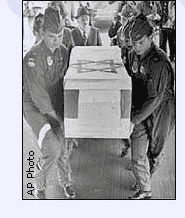 |
Eight Palestinian terrorists killed two and took nine members of the Israeli Olympic delegation (five athletes, four coaches) hostage. The terrorists' demand of the release of 200 prisoners held in Israel was denied, and the remaining hostages, five of the terrorists and one policeman were killed in a gunfight at a West German military airport. After a memorial service, the Games did go on. |
 |
Mark Spitz wins seven golds September 4, 1972 |
 |
Mark Spitz adds to his gold collection when he gains his seventh, swimming the butterfly leg on the United States' 4x100 medley team. Spitz was the first athlete to win seven gold medals in a single Olympiad. All seven wins (four individual, three relay) set world records. But Spitz -- a jew -- left Munich early after he and Olympic officials agreed he could be a target of further terrorism. |
 |
Bruce Jenner wins the decathlon July 30, 1976 |
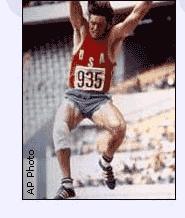 |
Bruce Jenner set personal bests in eight of the 10 events en route to smashing his own world record and winning a gold medal. After finishing 10th in the decathlon at the 1972 Olympics, Jenner had told the winner, the Soviet Union's Nikolai Avilov, "Next time, I'm going to beat you." He did, of course -- Avilov won the bronze -- and retired from track shortly thereafter. |
 |
Nadia Comăneci's perfection July 18, 1976 |
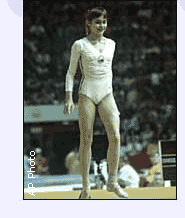 |
Before 1976, no gymnast had ever received a perfect 10 in Olympic competition. 14-year old Romanian Nadia Comăneci nailed seven of them, her first coming on the uneven bars and balance beam during team competiton. She left Montreal with three golds, a silver and a bronze. Comăneci also competed in the 1980 Games, winning two golds and two silvers. |
 |
The boycott April 12, 1980 |
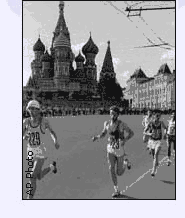 |
When Jimmy Carter's Feb. 20 deadline for the Soviets to pull troops out of Afghanistan passed, Carter followed through on his threat to boycott the Moscow Games. On April 12, the USOC voted to adhere to Carter's edict. Some of the 65 boycotting nations allowed athletes to compete under the IOC flag -- not the U.S., which threatened to expatriate Americans competing in Moscow. |
 |
Carl Lewis emulates his idol August 11, 1984 |
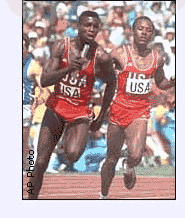 |
Carl Lewis' goal at the Olympics: duplicate Jesse Owens' 1936 performance by winning gold medals in the same four events that Owens did. Lewis, 23, already had won three -- the 100- and 200-meter dashes and the long jump. He equals his hero's mark as anchor for the U.S. 4x100 relay team, blazing through his 100 in 8.94 seconds as the team sets a world record of 37.83 seconds. |
 |
Mary Lou Retton's perfection August 3, 1984 |
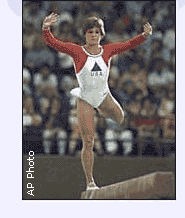 |
A 9.95 vault would enable 16-year-old Mary Lou Retton to tie for first in the women's gymnastics individual all-around. But Retton would have no part of a tie. She nailed her vault -- a full back somersault in layout position with a full twist -- and her perfect 10 made her the first American woman to win an Olympic medal of any kind in gymnastics. Retton also won two silvers and a bronze in L.A. |
 |
Greg Louganis' headache September 19, 1988 |
 |
While attempting to defend his three-meter springboard title, Greg Louganis hits his head on the board. His coach and a doctor dress his bloody wound. Louganis completes his prelim dives and wins the gold the following day. Years later, Louganis reveals he had known of his HIV-positive status at the time. Experts say other divers likely weren't at risk. Both the doctor and coach test negative. |
 |
FloJo was Seoul of Games September 29, 1988 |
 |
Florence Griffith Joyner, who had already made a splash with her colorful outfits, long, painted fingernails and outgoing personality, smashes the 200-meters world record and takes the gold medal. She also wins golds in the 400 and 4x100, and a silver in the 4x400. She then fueled speculation of steroid use by retiring on Feb. 25, 1989, just before mandatory random drug testing was implemented. |
 |
The Dream Team August 8, 1992 |
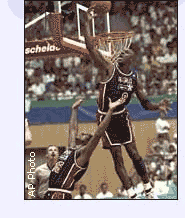 |
Though the victory over Croatia occured on Aug. 8, a U.S. gold had been a foregone conclusion. Forty months earlier, FIBA had voted to allow professional athletes to compete in the Olympics. The U.S. team of Bird, Johnson, Jordan, Robinson, Ewing, Pippen, Drexler, Malone, Stockton, Mullin, Barkley and Duke's Christian Laettner won their eight games by an average of 43¾ points. |
 |
Amy Van Dyken July 26, 1996 |
 |
Amy Van Dyken was a mediocre swimmer in high school. She suffered from asthma. She was a self-described "nerd." Oh, and in 1996 she became the first American woman in any sport to win four gold medals in one Olympics (100 butterfly, 4x100 free, 4x100 medley, 50 free). Janet Evans had won three swimming golds in 1988. Men's swimmer Matt Biondi won five golds in Seoul. |